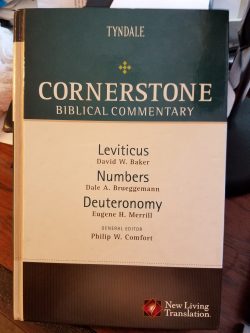Leviticus 9:1-24: Eternity in Liturgy
I have had very little time to post on Leviticus over the last few weeks because of my business, in which I’ve been working on three books simultaneously. But Leviticus has not been very far from my mind.
The more I read Leviticus, the more I like it. I’ve read through it with a variety of commentaries, generally reading it in Hebrew along with whatever commentary I’m currently working through. Each time I get more. In the case of the commentary I’m using presently, the Cornerstone Biblical Commentary on Leviticus, Numbers, and Deuteronomy, the particular focus is on the connection to Christian themes.
While one can argue that there isn’t any forward looking sense in Leviticus, I think it is close to impossible to argue that Christians did not look back to Leviticus and use its themes as the learned how to speak of the experience of Jesus and what his life, death, and resurrection meant to them. I’m going with that theme in looking at the book with specifically Christian eyes.
I’m rambling a bit, but stay with me. One of the neglected aspects of Christianity today is, I believe, a neglect of liturgy. Now I don’t have some sort of detailed checklist as to how liturgy should be conducted. What I do believe is that liturgy should bring us into the presence of God, i.e. bring us into the presence of eternity in some way. Most of our worship services do not function in this way at all.
At about the same time I read this chapter and this particular commentary on it I heard a sermon titled “The Eighth Day” in which the speaker suggested that we are to be living in the 8th day, somehow in the kingdom even though it’s not here yet. There’s a bit of a theme based on that in the appearances of Jesus in the book of Luke. I believe that we are to be living in eternity, and both our liturgy and our teaching needs to reflect that.
The liturgy in this passage reflects that full sense of history as we go from inauguration to glory and then to celebration of the glory in one pass.
The worship here involves everyone. It is emotional. It is educational. It is enthusiastic. It is also rewarded.
David W. Baker, author of this section of the commentary notes (p. 66):
… the people could not keep silent before a God who responded to their worship, so they joined their voices to those of the priests (9:24). God can and should be approached at times in stillness (Ps 46:10), but exuberance can also be appropriate. Everyone, young and old, male and female, was represented by the priests and leaders in the rituals; they each witnessed God’s response, and each responded appropriately in worship.
Just so!
